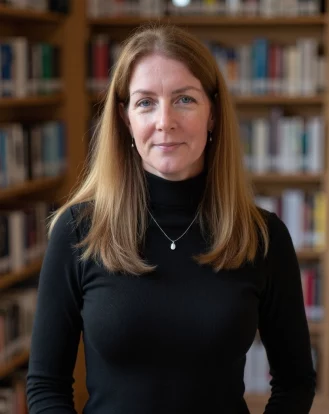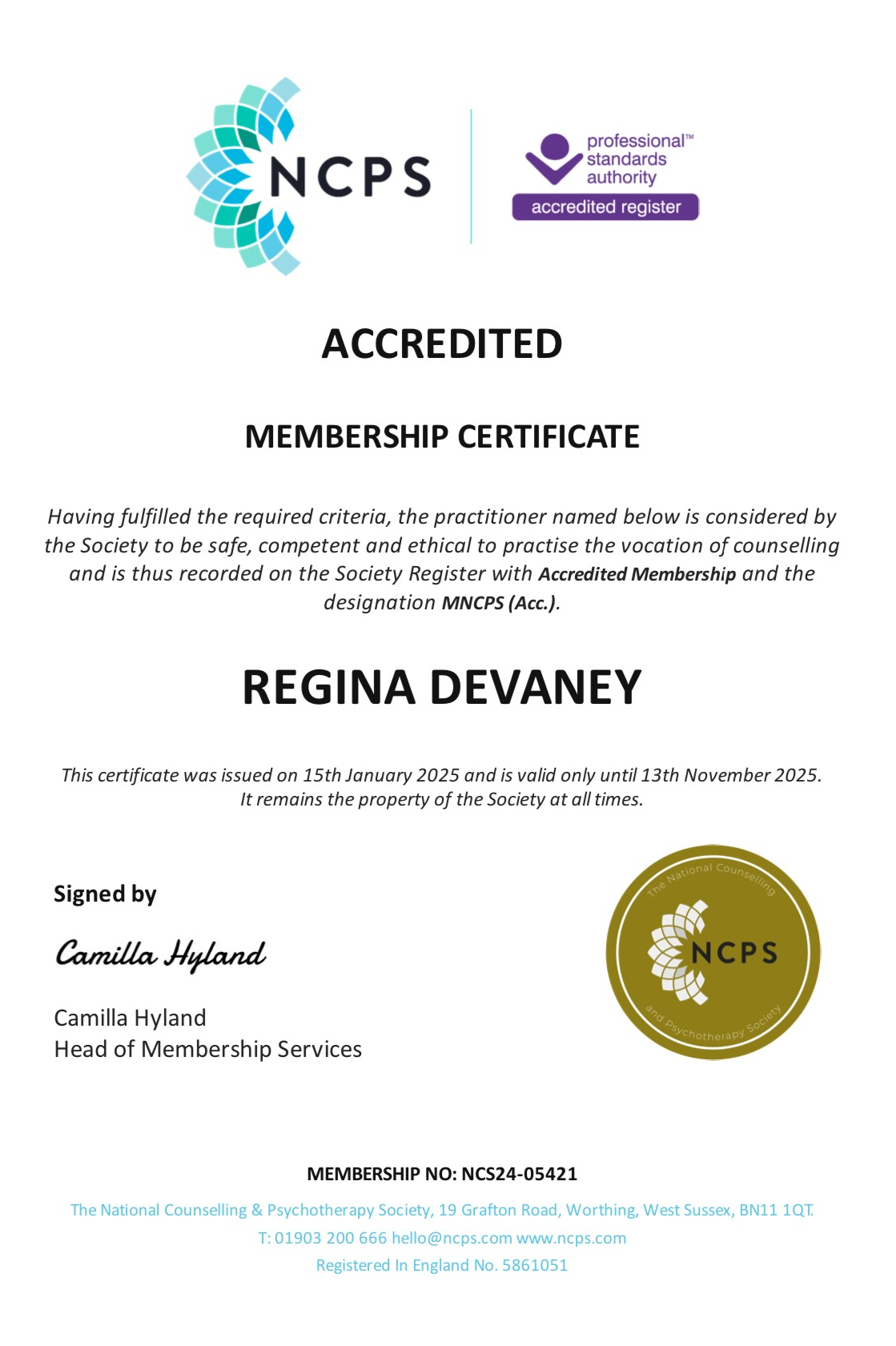Welcome to West Coast Counselling
Helping people to build their best lives.
COUNSELLING FOR ADULTS
Welcome, and thank you for visiting my website.
My name is Regina Devaney (Dipl. MNCPS Acc.) and I am a person-centred counsellor, meaning I believe an individual is capable of finding their own solutions and path forward. I am available to listen to you and help you discover your own way forward in what can be an often busy world these days.
I have experience is working with addiction, co-dependency, anxiety, depression, trauma and neurodiversity. More recently I have spent the past year as a counsellor in residential rehab working with individuals who have been struggling with alcohol, drug and other addictions as they rebuilt their lives. I have also volunteered with a charity supporting parents and guardians of neurodiverse young people.
Making the decision to see a counsellor is a big step to take - but it can be a positive one. Please read on to find out more about how I could help you.
HOW CAN COUNSELLING HELP?
I work with adults only and am based on the West Coast of Ireland. Whatever it is that you're struggling with, I'm here to help. As a person centred counsellor, I won’t tell you what to do as I believe you know yourself best and that you'll find your own answers, with the right support.
My role is to stay alongside you, listening without judgement. Together we can talk and explore your thoughts and feelings, in order to help you move forward and have the life that you want.
Here are a few of the more common difficulties that can be supported through counselling:
Trauma,
Drug and alcohol addiction
Self harm
Suicidal ideation
Neurodiversity
Family relationships & struggles
Codependency
Self esteem issues
Low confidence
Relationship breakdowns
Loss of identity
Grief
Financial issues
Homelessness
Depression
Feelings of powerlessness
Anxiety
Agoraphobia
SPEAK IN CONFIDENCE
Counselling takes place in a safe space, where you can meet with someone who will listen with sensitivity and empathy - and without judgement. In the therapy space thoughts and feelings can be expressed freely and in confidence.
A PROBLEM SHARED...
Many people face difficulties in their everyday lives that can be hard to get on top of. Counselling can help us gain a better understanding of what’s causing these problems - and how you can move towards managing or resolving them.
MAKE BETTER, HEALTHIER NEW CHOICES
Working together I can help you gain greater insight into the difficulties you are facing, help you understand why you act or react to them the way you do, and see how you can start to make better, heathier choices moving forward.
CONTACT ME
Feel free to contact me if you have any questions about how counselling works, or to arrange an initial free call. This enables us to discuss the reasons you are thinking of coming to counselling and whether it could be helpful for you.
You can also call me on +353 83 8966 912 if you would prefer to leave a message or speak to me first. All enquires are usually answered within 24 hours, and all contact is strictly confidential.
My Location
I am based in Sligo, on the West Coast of Ireland. I currently offer only online counselling sessions via Zoom, providing flexibility for clients both locally and further afield.
I hope to offer face to face session subject to demand, at a later date. Please contact me to discuss if face to face is something you would prefer.
FEES & AVAILABILITY
Session are 50 minutes and cost €60 per session.
A discount is available for First Responders including Gardai, Ambulance crew, Emergency Control Room staff, RNLI, Firefighters, Mountain Rescue, Coastguard and their families.
INITIAL CALL & CANCELLATION POLICY
An initial free call would involve me asking about your previous experience of counselling if any, your expectations of counselling and what your needs are at the time, and give us both an opportunity to see if I would be the most suitable counsellor for you, before committing your time and money.
If you wish to cancel an appointment, 24 hours notice is required, otherwise you will still need to pay for any sessions missed. All sessions are payable 24 hours in advance before a session to keep that slot for you. I accept payment via transfer only.
FREQUENTLY ASKED QUESTIONS
Counselling is usually a good way to help with a current problem; something that can be discussed and - hopefully - resolved within a limited number of sessions. Over a certain number of weeks the understanding of the problem improves and away forward becomes clear. Therapy often describes work that goes a bit deeper, towards more substantial life issues and problems having a deeper effect on the client’s life. Therapy often requires a long-term approach, so the number of sessions can be open-ended.
Which option is most suitable depends on the client and the difficulties they are facing. In some cases counselling works well as an ongoing, longer-term option - or therapy can manage to resolve an issue in just a few sessions.
How long a period of counselling lasts will vary from person to person and depend on the depth of the issues they are facing. For some people a couple of sessions helps to bring their problems into focus, and they feel ready to move forward; other problems may require more of an open-ended approach.
Before we begin any work we will agree on the number of sessions we’ll undertake, and at the end of that number review our progress. As long as we both agree further therapy will be of benefit to you, sessions can continue.
My aim is to offer a first appointment - known as an initial assessment - within 1-2 weeks. Then we would arrange a set number of counselling sessions to take place at the same time every week, that is convenient for you and where I have availabity. How quickly these sessions can begin will depend on the availabity of that free ‘slot’.
Everything that is said within the counselling room is private - this is one of the main ways counselling and therapy differ from talking to a friend or relative. Once you are comfortable with the format of weekly sessions and the safe space they provide, you will find the freedom to speak in confidence is of great value.
Note that there are some situations where you may be a risk to yourself or others, and there the law requires that I notify an authority; in these cases I may not be able to keep total confidentiality. Breaking confidentiality is very rare though, and only happens after the person concerned has been informed.
Usually I am asked this question by people who are nervous about entering into counselling, or when they are looking for support in coming to see a therapist. This anxiety is understandable, but a key aspect of therapy is that you should feel free to talk about any issues you feel are important to you. Having someone else with you who can be connected those issues makes this opening-up more difficult, so for this reason I do not see clients accompanied by friends or family.


